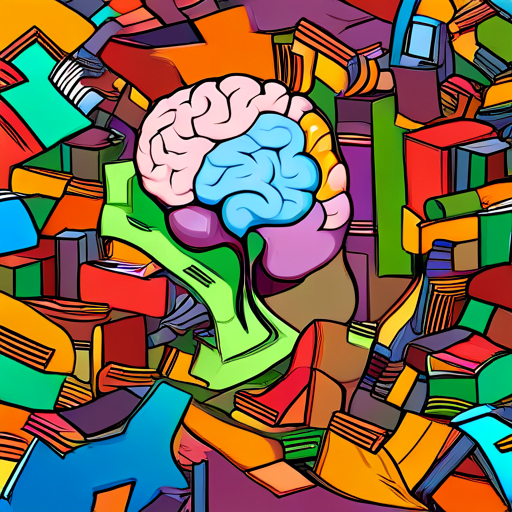Do you ever find yourself feeling stressed out or anxious? Do you struggle with connecting with others or expressing empathy? If so, you might want to consider picking up a book.
Regular reading has been shown to have numerous psychological benefits that can enhance your overall well-being. Not only can reading reduce stress and anxiety, but it can also improve your empathy and social skills. Additionally, reading can boost cognitive function, foster creativity and imagination, and promote lifelong learning.
So, whether you prefer fiction or nonfiction, the benefits of regular reading are undeniable. Let’s take a deeper look at how reading can positively impact your mental health and emotional intelligence.
Table of Contents
Reducing Stress and Anxiety

Feeling overwhelmed? Dive into a good book and watch as your stress and anxiety melt away.
Regular reading has been shown to have a significant impact on reducing stress and anxiety levels. This is because reading provides a temporary escape from the hustle and bustle of everyday life, allowing you to relax and unwind.
Moreover, reading can help you gain a different perspective on life, as you immerse yourself in the experiences and emotions of the characters in the book. As you become more absorbed in the story, your mind becomes less focused on your own worries and concerns, leading to a reduction in stress and anxiety.
So, if you’re feeling stressed or anxious, pick up a book and let yourself get lost in its pages.
Improving Empathy and Social Skills

By regularly diving into different perspectives through books, you can develop stronger social skills and a greater understanding of others’ emotions.
Reading exposes you to a wide range of characters and situations, allowing you to see the world from different angles.
As you read, you begin to empathize with the characters and understand their motivations and feelings. This ability to understand and relate to others can translate into real-life interactions, making you more effective in social situations.
Additionally, reading can improve your communication skills, as you learn new vocabulary and ways of expressing ideas.
In short, reading isn’t just a solitary activity; it can help you become more connected to the world around you.
Boosting Cognitive Function

Boosting cognitive function is a crucial aspect of reading that can’t be overlooked. When you read, you’re constantly engaging your brain, which helps improve your cognitive abilities.
Reading can also increase your vocabulary, improve your memory, and enhance your problem-solving skills. When you encounter new words while reading, your brain is forced to process and remember them, which can help expand your vocabulary.
Additionally, reading can stimulate your brain and keep it active, which can help prevent cognitive decline as you age. So if you want to boost your cognitive function and keep your brain sharp, make sure to incorporate regular reading into your daily routine.
Fostering Creativity and Imagination

Get your creative juices flowing and spark your imagination by delving into the current section on Fostering Creativity and Imagination!
Reading regularly can help you develop your creative side by exposing you to new ideas, perspectives, and worlds. When you read, your mind is free to wander and explore, allowing you to envision new possibilities and develop your own unique ideas.
By immersing yourself in a good book, you can escape the constraints of reality and let your imagination run wild. Whether you’re reading fiction, non-fiction, or poetry, each genre offers its own set of benefits that can help you tap into your creative potential.
So, grab a book, find a cozy spot, and let your mind wander – you never know where your imagination will take you!
Promoting Lifelong Learning

You can keep expanding your knowledge and skills by embracing lifelong learning. It’s all about exploring new ideas, trying out new things, and challenging yourself to grow and develop as a person.
Reading is an excellent way to cultivate this mindset. It exposes you to new perspectives and ways of thinking, expands your vocabulary, and enhances your critical thinking skills. Moreover, reading can help you stay up-to-date with the latest trends and developments in your field of interest, which can give you a competitive edge in your career or personal life.
By making reading a habit, you can continue to learn and grow throughout your life. This can lead to greater happiness, success, and fulfillment.
Frequently Asked Questions
Can reading too much actually have negative effects on mental health?
If you spend all your time reading, you may become isolated and miss out on social interactions. Additionally, constantly reading can be mentally exhausting and lead to burnout.
It’s important to take breaks and engage in other activities to maintain your mental well-being. So, while reading can have many benefits, it’s important to be mindful of how much time you spend doing it.
How does the type of reading material affect the psychological benefits?
If you enjoy reading self-help books or motivational novels, you may experience a boost in confidence and a more positive outlook on life.
On the other hand, reading suspenseful or thrilling novels can provide a sense of excitement and help alleviate feelings of boredom or monotony.
Even reading a simple magazine or newspaper can stimulate the mind and provide a sense of relaxation.
Ultimately, the type of reading material you choose is up to personal preference, but it’s important to recognize the potential psychological benefits that come with it.
Is there a certain time of day that reading is most beneficial for mental health?
Some people find that reading in the morning helps them start their day off on the right foot, while others prefer to wind down with a book before bed. However, research has shown that reading before bed can actually improve sleep quality and reduce stress levels.
Ultimately, the most important thing is to find a time that works for you and stick to it consistently. Whether it’s a few pages during your lunch break or a chapter before you go to sleep, regular reading can have significant benefits for your mental health.
Are there any specific genres or authors that are particularly effective in improving empathy and social skills?
For example, literature that explores complex human emotions and relationships, such as literary fiction and memoirs, can help readers develop a greater understanding of others’ perspectives.
Additionally, authors who prioritize character development and nuanced portrayals of their subjects can also be beneficial for building empathy. Examples include Chimamanda Ngozi Adichie, Celeste Ng, and Jhumpa Lahiri.
By seeking out these types of books, you may be able to enhance your interpersonal skills and deepen your connections with others.
Is there a limit to how much reading can improve cognitive function and creativity, or is there a point of diminishing returns?
However, like with anything, there is a point of diminishing returns.
While reading can improve critical thinking skills and expand your vocabulary, reading too much can lead to mental fatigue and decreased productivity.
It’s important to find a balance and not overdo it.
Don’t feel like you need to read every book out there.
Take breaks, switch up the genres you read, and give your brain time to rest and process what you’ve read.
Conclusion
But remember, it’s not just about the act of reading itself – it’s also about what you’re reading. Whether you prefer fiction or non-fiction, make sure you’re choosing books that challenge your thinking, broaden your horizons, and help you grow as a person.
So go ahead, pick up a book, and reap the benefits of regular reading. Your mind (and your mental health) will thank you for it.
